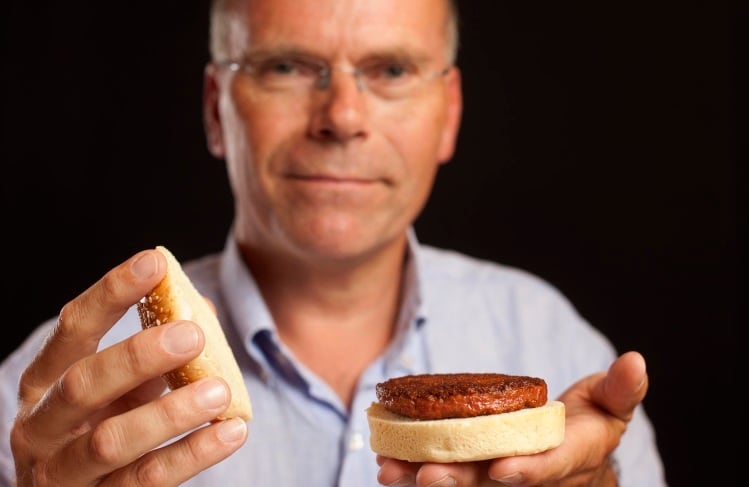Following the recent announcement of a partnership with animal nutrition specialists Nutreco and venture capital fund Lowercarbon Capital, GlobalMeatNews caught up with the CEO of Mosa Meat Maarten Bosch to discuss the progress and barriers in the cultivated meat sector.
He has been in his role since June 2019 and describes it as his “dream job”. He explains why he took up the position at one of the more high-profile cultivated meat businesses. “I don't have a background in food but rather in managing technology companies. I'm totally motivated by the higher purpose of the company.”
Bosch is realistic when outlining the current state of play for Mosa Meat and the cultivated meat sector. “It's still not a reality yet. We totally believe in it and we think it's going to happen but no product is out on the market.”
The business hit the headlines in 2013 when it created the first cultivated beef hamburger, spawning countless food technology companies to explore this sector, once thought of as science fiction.
Although Mosa Meat is looking beyond product development, Bosch explains that the science side is still a priority. Of the 40 team members at Mosa Meat, 35 are scientists.
“It's early stage and the science part is crucial,” he says. “We're almost at the end of the core scientific stage where we are going to be able to prove to the world that we can do this. The next stage is to be able to say we can do this at scale. The phase afterwards is the commercialisation phase so we still have a long way to go.
“But we're preparing for the future stages and science will remain important to us but other areas will become important as we scale up. Other aspects preventing us entering the market will deserve a lot of our attention such as regulatory approval as well as route to market. It's all areas that I'm more familiar with and is what I bring to the team.”
While Bosch insists that the entire process is still in “early stages”, he does give a loose time-frame for a roll-out, that is all dependent on regulatory approval.
“Definitely within the next decade and I would aim for the next five years. This year we will start with the development of our pilot plant [in The Netherlands].
“The goal of that project is not to create enough capacity to really enter the market at a large scale but rather to help create an industrial scale facility that will be built in the phase afterwards. Once that's up and running, that'll enable us to enter the market at a modest scale but at least we will be able to sell, depending on regulatory approval.
“Realistically the production facility will be up and running in the first half of 2022, and hopefully regulatory approval will be in place by then. We're aiming to enter a geographical market by 2022 and then after that it's how quickly we can scale up which will determine the roll-out to different channels.”
While other food businesses might see a two-year schedule for a retail launch as too long, Bosch insists that the business is taking a patient approach in order to get it right and without upsetting the traditional players in the market. “We're aiming for a long-term view. Of course we're in a hurry because we want to make this a reality but I think we are in it for the long-term.
“We also want to work with the existing value chain including processors. We don't want to go against the existing field out there - we have our own purpose and goals but we can work with them to make this a more sustainable and successful business in the long-term.”
Retail interest
One factor being considered even before the product is developed commercially, is route to market. Bosch says there’s a lot of interest right now but it may be some time before it’s in shopping baskets.
“We get a lot of interest from retailers and food service businesses. One of our investors, Swiss-based meat processor [Bell Food Group], has a lot of links to retail and to restaurants so we've been learning a lot from them but also other parties from around the world have been approaching us frequently. We're talking and preparing but it's still early stages.”
He says that as well as organising the retail partnerships, there’s also a battle to fought when it comes to consumer perception. “We have our internal challenges such as making the product work but there are also external challenges which include regulatory approval and how long that takes, and consumer acceptance. I think certain trends are working in our favour - the rise of plant-based meat alternatives, and whether they are successful or not is key, they're getting a lot of attention but we don't know the long-term impact of that sector. But I do think it helps generate awareness amongst end users that they think more about what they eat however we still need to be thoughtful about how we market our products.”
Bosch says that consumers and food businesses are looking ahead, hence the traditional meat processors investing in this area.
“If you look into why people are interested, it's mainly driven by impact on the environment and animal welfare. There's a real question of how are we going to feed 10 billion people in 20 years with the current system. On top of the existing system, a lot of players including meat processors see a role for cultured meat in the future.”
Collaboration
It’s not just shoppers and meat processors that are considering the future, hence the strategic partnership with Nutreco and Lowercarbon Capital. Bosch explains why they’re a perfect fit for Mosa Meat.
“Nutreco is intrinsically motivated to make this [partnership] into a business for them. They're interested in the alternative protein space for the reasons I've mentioned before. I feel they can play a role in our value chain and we need a supply of our raw ingredients including nutrients we feed to our cells at a price level that makes us competitive.
“Lowercarbon Capital is a new fund, founded by Chris and Crystal Sacca and their partner Clay Dumas. They have a history of investing in tech start-ups, although more traditional Silicon Valley businesses, and are now aiming their energy at what they call 'planet-healing technologies'. Their motivation is to help companies combat climate change. Their reputation for being able to pick out companies with potential as well as their focus on climate change is what made it a logical fit.”




